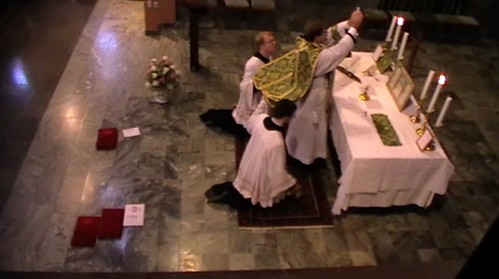Mass this morning looked more or less like this. Thanks to Pope Benedict and his document Summorum Pontificum, and thanks to our parish priest who took the initiative, we can, and do, have an Extraordinary Form Mass every Sunday, unfortunately at 8.00 am, which is hard when the mornings are dark and cold, and a difficult time for working people with families. There were about a couple of dozen people in the church, some of them regular weekday attenders. Unfortunately too, there was no opportunity for coffee afterwards so everyone just went straight home without talking to each other. The Mass was accompanied by discreet organ playing, though looking around at who was present, it could with preparation have been sung instead of said.
There is a different atmosphere in the church. The action is simple and uncluttered. The sense of flow is smooth and quiet There is a stronger sense of presence. One is not straining to hear words which are hard, sometimes impossible, to hear anyway because of the acoustics, the public address system, and people's dialects and unclear diction.
It would be an excellent thing if some of the weekday evening Masses were said in this form, so that an increasing number of parishioners had the chance to get used to it. At some time in the future, the use of the EF form could then be extended to feast days and to some of the main Sunday morning sung High Masses.
If the church is to flourish and grow, the use of this form of the liturgy must be a key element in its evangelistic efforts.
There is a different atmosphere in the church. The action is simple and uncluttered. The sense of flow is smooth and quiet There is a stronger sense of presence. One is not straining to hear words which are hard, sometimes impossible, to hear anyway because of the acoustics, the public address system, and people's dialects and unclear diction.
It would be an excellent thing if some of the weekday evening Masses were said in this form, so that an increasing number of parishioners had the chance to get used to it. At some time in the future, the use of the EF form could then be extended to feast days and to some of the main Sunday morning sung High Masses.
If the church is to flourish and grow, the use of this form of the liturgy must be a key element in its evangelistic efforts.

Kommentarer